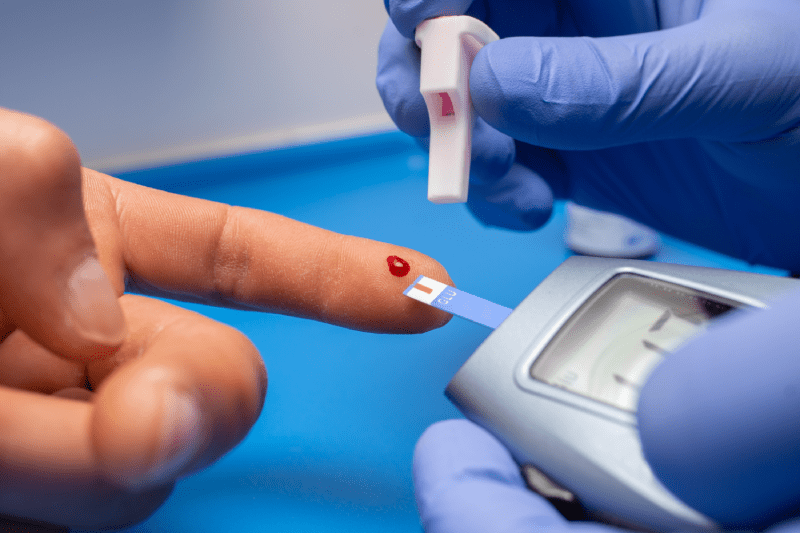What is the Main Problem Untreated Diabetes Causes in the Body?
The most fundamental problem that untreated type 2 diabetes causes in the body is the continuous elevation of blood sugar levels. Over time, high blood sugar causes irreversible damage to the blood vessels and nerve cells throughout the body. This leads to the emergence of two main complications known as “diabetic neuropathy” and “diabetic angiopathy.”
The damage that occurs in both micro and macro vessels affects all organ systems. In particular, the heart, kidneys, eyes, and nerve tissues are the most affected organs from this destruction. Failure to control blood sugar levels gradually leads to the deterioration of organ functions and can cause serious, even life-threatening conditions. For this reason, diabetes is not just a blood sugar problem but a systemic disease.
What is Diabetic Neuropathy and How Does It Affect the Body?
Diabetic neuropathy is nerve damage caused by high blood sugar levels. This condition usually affects the nerves in the hands and feet, so patients experience symptoms such as tingling, numbness, burning, or severe pain.
Over time, this feeling of numbness can lead to the formation of sores on the feet that go unnoticed, increasing the risk of infection. Untreated diabetic neuropathy can lead to “diabetic foot” syndrome and, in the worst-case scenario, can lead to amputation. It can also affect the autonomic nervous system, causing broader health problems such as digestive issues, bladder problems, erectile dysfunction, and uncontrolled blood pressure.
What Are the Effects of Diabetes on Heart and Vascular Health?
High blood sugar causes inflammation and damage to the walls of the arteries, which increases the risk of atherosclerosis (hardening of the arteries). In individuals with diabetes, blood vessels harden and narrow faster. This significantly increases the risk of heart attack and stroke.
In addition, diabetes brings with it other heart disease risk factors such as high blood pressure and high cholesterol. Untreated diabetes can lead to the weakening of the heart muscle and heart failure. Research shows that diabetes more than doubles the risk of heart disease compared to normal individuals. Therefore, diabetes management is critically important for protecting heart health.
What is Diabetic Retinopathy and How Does it Cause Vision Loss?
Diabetic retinopathy is an eye disease that occurs when high blood sugar damages the blood vessels in the retina, the light-sensitive tissue at the back of the eye. It may not cause symptoms in the early stages, but as it progresses, it causes small blood vessels in the retina to leak and swell.
Over time, these vessels can become blocked or new, abnormal, and more fragile vessels can form. These new vessels can bleed and blur vision. Untreated diabetic retinopathy increases the risk of glaucoma and cataracts and is one of the leading causes of blindness. Therefore, it is of vital importance for diabetic patients to have regular eye examinations.
What are the Destructive Effects of Diabetes on the Kidneys?
Diabetic nephropathy is a serious kidney disease that occurs when high blood sugar damages the small blood vessels in the kidneys. The kidneys are responsible for filtering the blood and removing waste products from the body. Due to diabetic damage, this filtering system is impaired. It initially manifests itself with protein leakage in the urine and can lead to kidney failure as it progresses. Untreated diabetes can lead to end-stage renal disease, which requires dialysis or a kidney transplant. Therefore, controlling blood sugar and blood pressure is of critical importance for protecting kidney health.
What is Diabetic Foot Syndrome and Why is It Dangerous?
Diabetic foot syndrome is a result of nerve and blood vessel damage in the feet due to high blood sugar. Nerve damage (neuropathy) leads to a loss of sensation in the feet, so small injuries, cuts, or blisters are not felt or noticed. Damage to blood vessels (angiopathy) slows down the healing process of wounds. When these two factors combine, even a small wound can quickly become infected and turn into gangrene. If the infection is not brought under control, amputation may become necessary to prevent limb loss. For diabetic patients, regular foot care and check-ups are of vital importance to minimize this risk.

What Are the Effects of Untreated Diabetes on the Digestive System?
Untreated diabetes can cause serious problems in the digestive system by damaging the autonomic nervous system. This can lead to a complication known as “gastroparesis.” Gastroparesis is the stomach’s decreased ability to empty food into the small intestine. Symptoms include nausea, vomiting, a feeling of early fullness, bloating, and heartburn. This condition affects nutrient absorption and can cause unpredictable fluctuations in blood sugar levels. If left untreated, this can lead to nutritional deficiencies and a severe decline in quality of life.
What Are the Negative Effects of Diabetes on Oral and Dental Health?
High blood sugar promotes bacterial growth in the mouth, which significantly increases the risk of gum disease. Gingivitis and periodontitis (infection of the tissues surrounding the teeth) are more common and more severe in diabetic patients. Gum diseases can make blood sugar control even more difficult, creating a vicious cycle. In addition, diabetes can also cause dry mouth, which in turn leads to an increase in tooth decay. Therefore, it is necessary for diabetic patients to have regular dental check-ups and to pay special attention to oral hygiene.
What Are the Effects of Diabetes on Skin Health?
Untreated diabetes can lead to various skin problems. High blood sugar increases the risk of skin infections, which causes frequent occurrences of bacterial and fungal infections (especially in moist areas such as the feet, groin, and armpits). Diabetes can also lead to a condition known as “acanthosis nigricans,” characterized by the darkening and thickening of the skin in areas such as the neck and armpits. Diabetic ulcers and slow-healing wounds are also a major problem. Therefore, diabetic patients need to regularly check their skin and be careful even with the slightest injury.
What Are the Effects of Diabetes on Psychological Health?
Diabetes is not just a physical illness but also a condition with serious psychological effects. The stress, fatigue, and lifestyle changes brought about by a chronic illness increase the risk of depression and anxiety in diabetic patients. The complications caused by diabetes can make patients feel helpless and hopeless. Depression makes diabetes management even more difficult, as patients may give up on taking their medication regularly, eating healthy, and exercising. Therefore, getting psychological support as part of diabetes management is of vital importance.
What Are the Effects of Diabetes on Sexual Health?
Untreated diabetes can cause sexual health problems in both men and women. In men, diabetes can lead to nerve and vascular damage, which significantly increases the risk of erectile dysfunction (erection problems). In women, nerve damage can cause vaginal dryness, lack of sexual desire, and orgasm problems. These conditions can lead to negative effects on relationships and a decrease in quality of life. Maintaining blood sugar control can help reduce the risk of such sexual health problems.
What is Diabetic Ketoacidosis and Why is it Dangerous?
Diabetic ketoacidosis (DKA) is a life-threatening condition that can occur in patients with untreated type 2 diabetes, although it is more common in patients with type 1 diabetes. When the body cannot produce enough insulin, it begins to burn fat for energy, and in this process, it produces acidic substances called ketones. The accumulation of ketones in the bloodstream makes the blood acidic. Symptoms include extreme thirst, frequent urination, abdominal pain, nausea, vomiting, and rapid breathing. If left untreated, it can lead to coma or death. This condition requires immediate medical intervention.
What is the Effect of Diabetes on Urinary Tract Infections?
High blood sugar causes an increase in the sugar level in the urine, which creates an ideal environment for bacterial growth. As a result, urinary tract infections (UTIs) are more common in individuals with diabetes. If these infections are left untreated, they can spread to the kidneys and lead to more serious health problems. Diabetic neuropathy can affect bladder function, causing urine to remain in the bladder, which further increases the risk of bacterial growth. Therefore, it is important for diabetic patients to consume enough fluids and to be careful about the symptoms of urinary tract infections.
What is the Effect of Diabetes on Mental and Cognitive Functions?
High blood sugar levels can negatively affect cognitive functions by damaging the blood vessels in the brain. Untreated diabetes has been shown to cause impairments in memory, learning, and decision-making abilities. Research shows that type 2 diabetes increases the risk of dementia and Alzheimer’s disease. Fluctuations in blood sugar levels directly affect brain functions and can cause difficulty in concentration and fatigue. Diabetes management is a critical step in protecting brain health.
What Are the Effects of Diabetes on Joint Health?
Untreated diabetes can cause problems in joint and muscle tissues. High blood sugar can lead to joint stiffness and a decrease in mobility. This can lead to conditions such as “frozen shoulder.” In addition, diabetes can affect tendons and connective tissue, increasing the risk of nerve compression problems such as carpal tunnel syndrome. The accumulation of sugar in the joint fluid can lead to joint stiffness and pain. Therefore, it is important for diabetic patients to maintain joint mobility by exercising regularly.
What Are the Effects of Diabetes on the Immune System?
High blood sugar weakens the function of the body’s immune system cells and reduces its ability to fight infections. Individuals with untreated diabetes are more vulnerable to infections, especially urinary tract infections, skin infections, and pneumonia. Infections can further increase blood sugar levels, making the condition worse. Therefore, it is necessary for diabetic patients to be careful about the symptoms of infection and to consult a doctor even with the slightest symptom.
What Are the Effects of Diabetes on Liver Health?
Untreated type 2 diabetes can lead to fat accumulation in the liver, causing non-alcoholic fatty liver disease (NAFLD). This condition can lead to inflammation and damage in the liver and can progress to cirrhosis and liver failure. Obesity and insulin resistance play a key role in the development of fatty liver disease. Controlling blood sugar and losing weight can help reduce fat in the liver and improve liver function.
What Are the Other Problems Diabetes Causes in the Eyes?
Apart from diabetic retinopathy, diabetes can cause other problems in the eyes. High blood sugar can cause the eye’s lens to swell, which temporarily leads to blurred vision. In addition, diabetes also increases the risk of cataracts (clouding of the eye’s lens) and glaucoma (increased pressure inside the eye). While cataracts are more common in older individuals, they can develop at an earlier age in diabetic patients. Glaucoma can cause damage to the optic nerve, leading to permanent vision loss. Therefore, regular eye examinations are of vital importance for the early detection of such problems.
What Are the Effects of Diabetes on Blood Pressure?
Diabetes and high blood pressure (hypertension) are often related, and both increase the risk of heart disease. High blood sugar reduces the elasticity of blood vessels and damages the vessel walls, which causes blood pressure to rise. Untreated diabetes and high blood pressure significantly increase the risk of kidney failure, heart attack, and stroke. In addition to blood sugar control, regular monitoring of blood pressure and taking medication when necessary are of vital importance to reduce these risks.
What is Diabetic Coma and Why Does It Develop?
Diabetic coma is a state of unconsciousness that occurs when blood sugar reaches very high (hyperglycemia) or very low (hypoglycemia) levels. Untreated hyperglycemia can lead to serious complications such as diabetic ketoacidosis or a hyperosmolar hyperglycemic state, which can cause a coma. Hypoglycemia, on the other hand, can lead to unconsciousness when blood sugar drops to dangerously low levels. Both conditions require immediate medical intervention and can be fatal if left untreated. Therefore, it is very important to regularly check blood sugar and recognize the symptoms.
What Are the Effects of Diabetes on Healing Processes?
Diabetes severely impairs the body’s ability to heal itself. High blood sugar levels reduce the function of immune system cells, and damage to blood vessels prevents blood flow that carries oxygen and nutrients to the wounds. This causes cuts, wounds, and infections to heal more slowly. In diabetic patients, even a small wound can turn into a chronic ulcer. Post-surgical healing times are also longer and the risk of infection is higher. Therefore, effective management of diabetes is of vital importance for any wound or injury to heal quickly and smoothly.

What is the Effect of Diabetes on Sleep Apnea?
There is a strong relationship between diabetes and sleep apnea. Sleep apnea is a serious sleep disorder characterized by temporary cessation of breathing during sleep. Obesity is a major risk factor for sleep apnea, and obesity is also a major risk factor for type 2 diabetes. These three conditions often occur together. Sleep apnea can increase insulin resistance and make blood sugar control more difficult by causing fluctuations in oxygen levels in the body. Treating sleep apnea can help improve blood sugar levels and better manage diabetes.
How Is the Relationship Between Diabetes, Depression, and Anxiety?
Diabetes increases the risk of depression and anxiety. Lifestyle changes caused by diabetes (diet restrictions, exercise requirements), chronic fatigue, and the stress brought about by the disease can negatively affect mental health. In particular, fluctuations in uncontrolled blood sugar levels can lead to mood swings and irritability. Depression and anxiety can make diabetes management more difficult, leading to behaviors such as poor nutrition and skipping medication. This vicious cycle negatively affects both physical and psychological health. Therefore, the importance of psychological support in diabetes management is great.
How Are Healing Processes Affected by Diabetes?
Untreated diabetes severely impairs the body’s ability to heal itself. High blood sugar levels reduce the function of immune system cells, and damage to blood vessels prevents blood flow that carries oxygen and nutrients to the wounds. This causes cuts, wounds, and infections to heal more slowly. In diabetic patients, even a small wound can turn into a chronic ulcer. Post-surgical healing times are also longer and the risk of infection is higher. Therefore, effective management of diabetes is of vital importance for any wound or injury to heal quickly and smoothly.
What Are the Effects of Diabetes on Blood Clotting?
High blood sugar can affect the blood clotting system, causing the blood to clot more easily. This increases the risk of clot formation (thrombosis) within the blood vessels. Clots that form can lead to a heart attack when they block blood vessels in the heart, and a stroke when they block blood vessels in the brain. The vascular damage caused by diabetes further increases this risk. Therefore, anticoagulant treatment (blood thinners) may be necessary in individuals with diabetes.
What Are the Effects of Diabetes on Reproductive Health?
Untreated diabetes can lead to reproductive health problems in both men and women. In women, hormonal imbalances increase the risk of menstrual irregularities and polycystic ovary syndrome (PCOS), which can make it difficult to get pregnant. In men, high blood sugar levels can negatively affect sperm quality and quantity. In addition, diabetes carries serious risks for both the mother and the baby during pregnancy. Uncontrolled diabetes increases the risk of miscarriage, premature birth, and developmental disorders in the baby.
What Are the Effects of Diabetes on Hair Health?
Diabetes can also negatively affect hair health. High blood sugar prevents sufficient blood and nutrients from reaching the hair follicles. This can cause hair to become weak, brittle, and fall out. Thyroid problems are also more common in individuals with diabetes, which can also trigger hair loss. To protect hair health, it is important to keep blood sugar levels under control, eat a balanced diet, and take necessary vitamin supplements.
What Are Diabetic Musculoskeletal System Problems?
Untreated diabetes can cause stiffness in joints and muscles, leading to limited mobility. In diabetic patients, stiffness and pain are common, especially in the shoulder, hand, and foot joints. Conditions such as “frozen shoulder” (adhesive capsulitis) and carpal tunnel syndrome are more common in individuals with diabetes. High blood sugar changes the structure of a protein called collagen, hardening connective tissue and reducing its flexibility.
What Are the Effects of Diabetes on Body Weight?
Type 2 diabetes can be a condition that leads to weight gain. High insulin levels increase the body’s fat storage. At the same time, uncontrolled blood sugar fluctuations can cause a constant feeling of hunger and an increased craving for carbohydrate-rich foods. This creates a vicious cycle that triggers weight gain and obesity, making diabetes even worse. Treatment helps break this cycle by providing blood sugar control.
What Are the Effects of Diabetes on Hearing Loss?
High blood sugar can damage the small blood vessels and nerves in the ears, which can lead to hearing loss. Research shows that individuals with diabetes have a higher risk of hearing loss. Therefore, it is important for diabetic patients to keep their blood sugar levels under control and to be careful about the symptoms of hearing loss.
What Are the Effects of Diabetes on Heart Failure?
Untreated diabetes weakens the heart muscle and increases the risk of heart failure. High blood sugar and high blood pressure put an extra burden on the heart muscle and, over time, reduce the heart’s ability to pump blood effectively. This can lead to symptoms such as fatigue, shortness of breath, and swelling in the legs. Diabetes management is of vital importance to reduce the risk of heart failure.
What Are the Effects of Diabetes on Gingivitis and Tooth Loss?
High blood sugar can cause gingivitis and a more serious gum disease called periodontitis. Diabetes promotes the growth of bacteria in the mouth, which leads to inflammation in the gum tissues. Uncontrolled periodontitis can cause tooth loss by making the teeth lose their bone support. In addition, gingivitis makes blood sugar control even more difficult. Therefore, regular dental check-ups and a good oral hygiene routine are important.
What Are the Effects of Diabetes on the Circulatory System?
Untreated diabetes damages blood vessels, leading to circulatory system problems. The hardening and narrowing of the blood vessels (atherosclerosis) restrict blood flow. This can lead to symptoms such as coldness, numbness, and pain in the hands and feet. In severe cases, a complete cutoff of blood flow can cause gangrene and limb loss. In addition to blood sugar control, regular exercise is also important for protecting the circulatory system.
What Are the Effects of Diabetes on Muscle Mass?
Untreated diabetes can lead to muscle mass loss. High blood sugar can impair the body’s protein synthesis and accelerate the breakdown of muscle tissue. This can cause weakness and fatigue. In addition, weight loss and lack of exercise can also trigger muscle loss. Diabetes management is important for preserving muscle health.
What Are the Effects of Diabetes on Shoulder Pain and Stiffness?
Shoulder stiffness and pain (frozen shoulder) are common complications in individuals with diabetes. High blood sugar causes the tissues around the shoulder joint to harden and lose their flexibility. This makes it difficult to move the arm and causes pain. Diabetes management and regular exercise can help maintain shoulder mobility.
What Are the Effects of Diabetes on Body Fat Distribution?
Uncontrolled diabetes can lead to the accumulation of body fat, especially in the abdominal area. This is related to insulin resistance. Fat in the abdominal area is closely linked to the risk of metabolic syndrome and heart disease. Effective management of diabetes and weight control can help reduce this type of fat accumulation.
How to Cope with Diabetic Gastroparesis?
Diabetic gastroparesis is a problem where food moves slowly from the stomach to the small intestine. To cope with this condition, dietary changes such as eating small and frequent meals, avoiding fibrous and fatty foods, and pureeing foods are important. In severe cases, your doctor may recommend treatment methods such as medications or gastric botox.

What Are the Effects of Untreated Diabetes on the Immune System?
High blood sugar weakens the function of immune system cells and reduces their ability to fight infections. This makes individuals with diabetes more vulnerable to fungal infections, pneumonia, and urinary tract infections. Uncontrolled blood sugar increases the risk and severity of infections.
What is the Effect of Diabetes on Post-Surgical Healing?
The post-surgical healing process for individuals with diabetes can be longer and more complicated. High blood sugar damages blood vessels, preventing sufficient blood flow to the surgical area, which slows down wound healing. In addition, the risk of infection is higher. Therefore, it is of vital importance to keep blood sugar under tight control before and after surgery.
What is the Effect of Diabetes on Calluses and Swelling on the Feet?
Diabetes causes a loss of sensation due to nerve damage (neuropathy) in the feet. This can accelerate the formation of calluses in areas of the feet that are exposed to pressure. In addition, vascular damage can cause swelling and circulatory disorders in the feet. Diabetic foot care and choosing appropriate shoes are critically important for preventing these problems.
What Are the Effects of Diabetes on Muscle Weakness?
High blood sugar makes it difficult for muscle cells to use glucose for energy, which can lead to muscle weakness and fatigue. Diabetic neuropathy further increases muscle weakness by damaging the nerves that control muscles. Regular exercise and a healthy diet can help preserve muscle mass.
What is the Effect of Diabetes on Life Expectancy?
Untreated diabetes can significantly shorten life expectancy. Heart disease, stroke, kidney failure, and other complications can lead to premature death. However, the effective management of diabetes significantly reduces these risks and improves quality of life.
What Are the Skin Spots Caused by Diabetes?
Untreated diabetes can cause brown or purple spots to form on the skin. These spots are usually seen on the lower legs and are known as “diabetic dermopathy.” In addition, the darkening and thickening of the skin in areas such as the neck and armpits (acanthosis nigricans) can also be seen. These conditions can usually improve when blood sugar is brought under control.
What Should I Do If I Have Questions About Untreated Diabetes?
It is vital to get expert advice to learn more about the potential effects of untreated diabetes on your body or to create a treatment plan. By working with expert teams like Cure Holiday, you can create a personalized treatment plan and get all your questions answered. Cure Holiday is here to support you at every stage of your treatment process.


